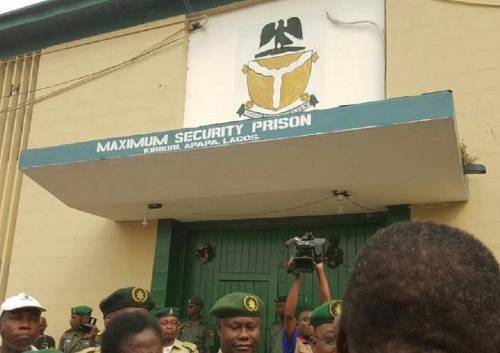As many as 101 people who were arrested for alleged links with Boko Haram have been kept incommunicado at the Kirikiri medium and maximum correctional centres, Lagos State, for 13 years now, Daily Trust reports.
Activists following the case said some of the victims had died in custody long after they were granted bail by the courts but not released by the authorities.
It was learnt that the detainees were separately arrested in Borno, Bauchi and Kano states on suspicion of being members of Boko Haram in late 2009 when police and other security agencies embarked on raids that led to the arrests of suspected members of the terrorist organisation.
Since then, they have been in detention with no hope of freedom any time soon.
According to an official of the Legal Aid Council, which has been pursuing the case, the detainees were arrested by the police at various places in Maiduguri in Borno State, Kano and Bauchi.
“Some of the suspects were arrested in their homes, business premises, mosques, or travelling on the highways during raids carried out by the police,” an official of the council said.
He said that a total of 164 persons were arrested in the wake of the outbreak of the disturbances by members of Boko Haram in Maiduguri in July 2009.
“From our investigation, more than 160 persons were arrested, but we now have 101 still in detention. They were initially 104, but three died in detention while six others have mental problems due to trauma,” he said.
He said the detainees were initially arraigned before courts in Kano, Maiduguri and Bauchi. He said the courts granted them bail but some of them could not meet their bail conditions; hence they are still in detention.
“They were separately detained in correctional centres in Kano, Maiduguri and Bauchi pending the time they would meet their bail conditions. However, in March 2011 they were all herded into a truck and moved to Lagos.
“We have 74 being detained in the Kirikiri Maximum Correctional Centre while 27 are detained in Kirikiri Medium Correctional Centre,” he said.
He said that after their movement to Lagos, there was an order that they should not be allowed access to their relatives. He added that many of them had lost contact with their relatives.
He said the detainees were charged with offences which mostly carried a maximum of four years imprisonment.
“What it means is that they would have even served their terms by now if they had been convicted,” he said.
He said because the cases had been delayed this long, it would even be difficult to get witnesses to convict them. He said their movement to Lagos had made it impossible to prosecute them as their cases could only be heard by a court where the alleged offenses were committed.
“They could not also be detained under the terrorism act as the law was passed after their arrest, and it does not have a retrospective effect.
“These people should be released or brought back to the respective places of their arrest and be prosecuted. This is a clear case of human rights abuse, which should be addressed immediately in the interest of justice,” he said.
It was learnt the director-general of the Council had written the Attorney-General of the Federation for his intervention.
In the letter, the director-general stated that there was no further reason to keep the suspects in detention since the authorities had lost interest in the case.
He also noted that the detainees had undergone a de-radicalisation programme organised by the government while inside the correctional centre.
In a similar effort to ensure justice for the victims, a Lagos-based non-governmental organisation, The Incorporated Trustees of Prisoners’ Rights Advocacy Initiative filed a case before a Federal High Court in Lagos seeking their release.
The case was brought against the Attorney-General of the Federation, the Inspector General of Police, the National Security Adviser and the Comptroller-General of Correctional Service.
In the suit, they asked the court to declare that the arrest and continued detention of the applicants for many years without proper arraignment and trial in a court of competent jurisdiction was unlawful, unconstitutional and an infringement of their fundamental right to freedom of personal liberty, the right to be tried within a reasonable time by an impartial court/tribunal and respect for the dignity of the human person.
The applicants also sought their unconditional release and a perpetual injunction restraining the respondents or their agents from further interfering with their fundamental human rights in any manner.
However, in October 2021, Justice A. Lewis-Allagoa, dismissed the case in his judgement.
The judge said the applicants had failed to show that both the Attorney-General of the Federation and the National Security Adviser had infringed on their fundamental human rights as they failed to show that they ordered their arrest or detention.
Ahmed Adetola-Kazeem, a lawyer who represented the detainees said that he was disappointed in the judgement but would continue to pursue the issue through other avenues until they are freed.
One of the detainees, who pleaded anonymity, said they were disappointed with the turnout of the judgement. He said many of them had given up on ever regaining their freedom unless a miracle happened.
He said three of them had died while six had gone mad because of the condition they found themselves.



No comments yet
Be the first to share your thoughts!